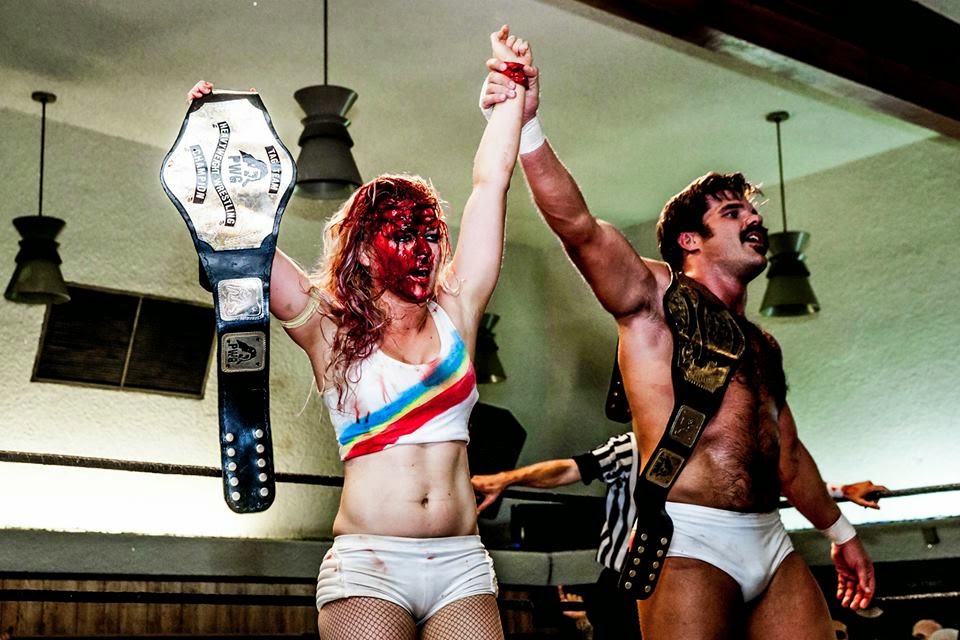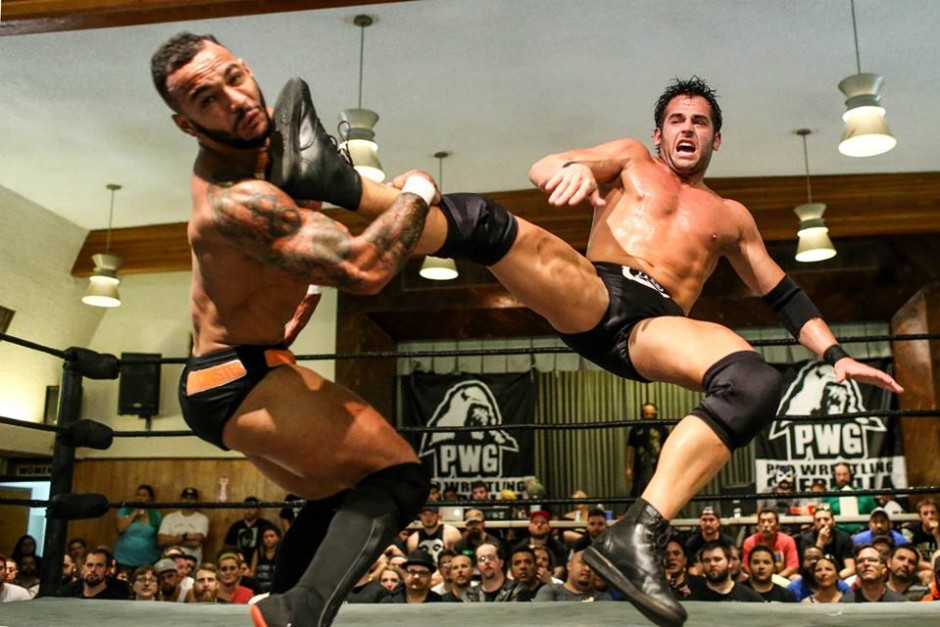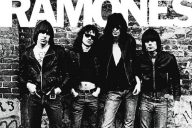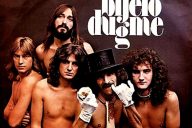In November 2013, I wrote for Shoot Farken about Pro Wrestling Guerrilla, a small professional wrestling promotion based Reseda, California. PWG has a reputation for providing some of the most insane in-ring action you’ll find in North America, backed up by the terrific atmosphere provided by the crowd. Even UFC champion Ronda Rousey and Modern Family’s Sofia Vergara have recently checked out PWG to see what all the fuss was about.
With ‘prime time’ wrestling struggling to entertain in the post-Monday Night Wars world, many of the hardcore wrestling fans that eagerly tuned in weekly back in the late 90s have now tuned out permanently. Others who have stuck around now get their fix in the burgeoning independent wrestling scene, and in 2013 there was no hotter promotion than PWG.
However, PWG has faced significant losses to its ‘indie all-star’ line-up. Adam Cole was their champion at the time of my previous article (and indeed remains the longest-reigning PWG champion); he has since signed an exclusive contract with Ring of Honor, meaning he can no longer wrestle for PWG.
Other PWG stars to sign exclusive contracts with the former bastion of indie wrestling include Kyle O’Reilly (who defeated Cole for the title) and his tag partner Bobby Fish, and Michael Elgin. None have appeared on a PWG show since 2014.
PWG have also lost Davey Richards (another former champion) and Eddie Edwards, the ‘American Wolves,’ to their commitments with Impact Wrestling/TNA, but the biggest threat of all to indie promotions seems to be the #1 show in town – the WWE.
The NXT Revolution
In August 2012, WWE restructured its developmental promotion, rolling up Florida Championship Wrestling and establishing ‘WWE NXT.’
NXT had previously been the moniker of a pseudo-reality show, where established WWE wrestlers guided ‘rookies’ in a bid to win a spot on the main roster.
While the show itself was often so horrifically bad it could be deemed unfit for human consumption, it nonetheless provided a start for the Nexus, of whom member Daniel Bryan (albeit only a member for one night thanks to an unfortunate mistake) later went on to become WWE Champion and a massive fan favourite. Bryan too is a former PWG champion.
Nexus leader Wade Barrett has since established himself as a reliable mid-card performer. Darren Young (another Nexus member) and Titus O’Neil, the current WWE tag team champions, both got their start on NXT, as did other Nexus alum Ryback (as Skip Sheffield), Bray Wyatt (as Husky Harris), Curtis Axel (as Michael McGillicutty) and Heath Slater.
AJ Lee, comfortably the most popular female wrestler in WWE in recent years, came up through NXT, as did fellow WWE Divas Champion Kaitlyn and current roster member Naomi.
So it’s clear WWE already had found a launchpad for marketing its next generation, but the concept clearly needed an overhaul. Kissing contests and obstacle courses made way for actual wrestling matches, allowing indie stars like Sami Zayn (former PWG champion El Generico) and Adrian Neville (a.k.a. Pac, another talented wrestler who has appeared in PWG) to gain some positive exposure before being introduced on the main WWE shows.
Unlike Florida Championship Wrestling, NXT has been given much greater impetus by the WWE – its weekly shows are featured on the WWE Network, while there is talk of growing the brand into a separate entity. The driving forces behind this progression are undoubtedly the indie stars that have been recruited, as though WWE is attempting to harness the atmosphere and feeling of the independent wrestling scene.
Indeed, it is working. NXT now has its own ‘TakeOver’ pay per view style super shows. And it’s proving to be a major hit with wrestling fans. The next edition of TakeOver will be the first held outside of NXT’s base at Full Sail University, moving to the Barclays Centre – which it has quite incredibly sold out.
In 2013, WWE NXT began signing up some of the top indie and international wrestling stars, such as current NXT champion Finn Balor (who wowed crowds in Japan, Britain and even PWG as Prince Devitt) – and of course this further added to PWG’s woes.
NXT had already taken El Generico from the indies in January of 2013, and later joining him there were fellow PWG regulars Samuray del Sol (now Kallisto), who signed in May, and then Sami Callihan (now Solomon Crowe) in August.
In a major shock, former PWG champion Kevin Steen (now Owens) joined NXT in August 2014 – a surprise because despite his talent, Steen clearly did not possess the prototypical WWE physique.
It is somewhat less of a shock that Owens quickly became a major star in NXT, and even on the main roster, where he defeated John Cena – clean – on PPV, before the WWE backpedalled and had Cena beat him twice in a row. This was supposedly because Cena’s merchandise sales dipped after the initial match).
Even former death match wrestler and PWG favourite Drake Younger (Drake Wuertz) left the indie scene for WWE in March 2014, switching in-ring competition for an NXT referee’s shirt.
Uhaa Nation (now Apollo Crews), an impressive talent who shocks fans with his high-flying moves, despite his body-builder physique, had only just started wrestling for PWG after these departures had opened up roster spots.
He joined NXT in April 2015, while PWG regular Johnny Gargano appears to also be on the radar having wrestled Uhaa in an NXT untelevised match.
Last week, Gargano and fellow-PWG roster member Tommaso Ciampa appeared as a tag team at an NXT taping, defeating WWE-contracted duo Bull Dempsey and Tyler Breeze.
Given that WWE is the only major global brand in wrestling currently, and remains the biggest show in town, it’s not hard to see the lure for the world’s best indie wrestlers of signing with NXT – and as it continues to expand from developmental system to a promotion with its own clear identity, the threat will likely grow.
PWG’s new blood
With Cole, O’Reilly, Fish, Elgin, Richards, Edwards, Steen and Younger – 4 former champions – gone, along with the previous departures of El Generico (make that 5 champions), del Sol and Callihan, PWG had no choice but to seek out some new faces who could help to maintain the high quality of their shows.
Despite the significant loss of star power, several PWG stalwarts remained: Roderick Strong, now PWG champion; The Young Bucks, arguably the best tag team act on the planet today; PWG co-founder Joey Ryan and his tag team partner Candice LeRae, the only female member of the PWG roster; and indie veterans Ricochet, ACH, Rich Swan, AR Fox, Chris Hero (who returns from a stint in WWE developmental), Johnny Gargano, Brian Cage, Tommaso Ciampa, Chuck Taylor and his tag partner, Trent? (Trent Barreta), who was criminally underused during his stint in the WWE.
Another talented and underutilised former WWE midcarder, Evan Bourne (Matt Sydal) has also begun making regular appearances in PWG, while Biff Busick and Drew Gulak from Combat Zone Wrestling have also joined the PWG crew. PWG co-founder Super Dragon recently emerged from a long hiatus to reform dominant faction ‘Mount Rushmore’ with Strong and the Young Bucks (the former two replacing original members Cole and Steen).

As PWG’s lone female wrestler, Candice LeRae fights men, has won the PWG tag titles with Joey Ryan, and undoubtedly is ‘tougher than you.’ (Source: Devin Chen Photography)
So while a solid core of performers was intact, the question remained – where would PWG find exciting new talent to replace wrestlers of the calibre of Steen, Generico, Elgin and Cole?
The spirit of PWG – a seemingly utopian promotion free from backstage politics, where wrestlers are free to put on the show of their lives – appears to have inspired promotions in Canada and England.
PROGRESS Wrestling, established in 2011 in London, England, has been a breath of fresh air to the wrestling scene. Promoting themselves as ‘strong-style’ wrestling coupled with the atmosphere of a punk rock show, PROGRESS have quickly gained attention locally and internationally for their high-energy events.
Clearly someone at PWG has been paying attention to the upstart British promotion, as exciting talents featured on PROGRESS shows like Zack Sabre Jr. – an instant hit to American audiences – and Holland’s Tommy End have already appeared on PWG shows.
Sabre and End will return to PWG for the annual Battle of Los Angeles tournament later this month, and joining them will be fellow PROGRESS stars Mark Andrews (who is now working in America at TNA), ‘Party’ Marty Scurll and the PROGRESS champion, Will Ospreay. This comes after Roderick Strong and Tommaso Ciampa competed in the ‘Super Strong Style 16’ earlier this year, essentially PROGRESS’ version of the PWG BOLA tournament.
PROGRESS Chapter 13 is available to watch in full on YouTube, and we highly recommend that any fan of pro wrestling take a look – Zack Sabre Jr.’s match with a WWE-bound Prince Devitt being a highlight, along with the ladder match main event between Jimmy Havoc and the now TNA-contracted Mark Andrews.
It should become immediately apparent to the viewer that the combination of quality wrestling and a rowdy crowd, as though they’ve come straight from a lower-league football match after a few beverages, is a winner, much like it is in PWG.
And as also seen on this show, ‘Finn Balor’ was always a man who knew how to make an entrance.
Smash Wrestling of Toronto, Canada was formed in 2012 and seems to have caught onto the PWG recipe for entertainment. Indeed, many current and former PWG regulars have worked there, including the Young Bucks, Hero, Gargano, LeRae and Ryan.
In return, Smash has provided PWG and the American indie scene with a new star – ‘Speedball’ Mike Bailey. Bailey hails from Quebec and wrestles barefoot, incorporating martial arts kicks with high impact moves. He’s also completely insane, as this crazy spot from PWG’s ‘Don’t Sweat the Technique’ displays. Bailey has immediately proven to be an excellent fit for PWG and he surely has a bright future in pro wrestling.
Another member of the Smash roster to appear in PWG is Josh Alexander, who teams with fellow Ontarian Ethan Page as Monster Mafia. The Canadian pair has already held the PWG Tag Titles, though quite briefly – winning and losing the championship in the DDT4 tournament earlier this year. Sadly, Josh Alexander’s promising career has come to a premature end due to a neck injury, though he ended his PWG run with a memorable match – and a manic stint on commentary – at Mystery Vortex III.
International talents aren’t the only ones making a splash in PWG. Page and Alexander dropped the titles to fellow newcomers, New Yorkers Alex Reynolds and John Silver, ‘The Beaver Boys’ – both men trained by former ECW fan favourite Mikey Whipwreck.
In turn, Reynolds and Silver lost the tag titles in the final of DDT4 to exciting young duo Andrew Everett and Trevor Lee. Everett is 25 years old and Lee just 21, yet both men have been wrestling since they were 17 and 16 respectively.
Everett clearly has a lot of potential, and his high-risk, high-flying style is a comfortable fit for PWG’s fast and furious shows. He’s also shown a lot of courage to come back from an ACL injury suffered in 2014, particularly given his penchant for risk taking.
Lee, however, is possibly the brightest star on the US indie scene. Trained in part by former WWE stars Matt and Jeff Hardy, the ‘Carolina Caveman’ has already shown in PWG that he can wrestle in a variety of styles, and the obvious comparison to Daniel Bryan goes beyond the physical resemblance. Lee truly appears to be a wrestler who can do it all in the ring.
Lee perhaps needs to work on establishing his in-ring persona, as it’s currently unclear on exactly who or what he is trying to be. In this respect his diverse move set also seems to work against him at times, as does his curious choice of using the small package roll-up as a finisher despite wrestling as a babyface.
Nonetheless, Lee is already making waves in bigger promotions – in July he teamed with ex-WWE C-show staple Brian Myers (Curt Hawkins) to defeat Richards and Edwards for their TNA Tag Team Championship a day after debuting in the #2 American promotion, before dropping the titles back to the Wolves the night after that.
However, if the WWE feels they can catch lightning in a bottle twice (and you just know they are going to try), it may not be too long before Lee is snatched away from PWG and even TNA as NXT’s latest star recruit.
Inevitably the WWE will come calling on the indie scene’s hottest talents again, but it’s clear that smaller promotions like PWG can survive without their established stars. New talent is emerging in several regions, and burgeoning promotions like PROGRESS and Smash show that PWG is not alone in keeping wrestling’s heart and soul alive, and away from the clutches of the WWE machine.
*Main photograph from PWG’s Battle of Los Angeles (2014). Source: David Chen Photography
















